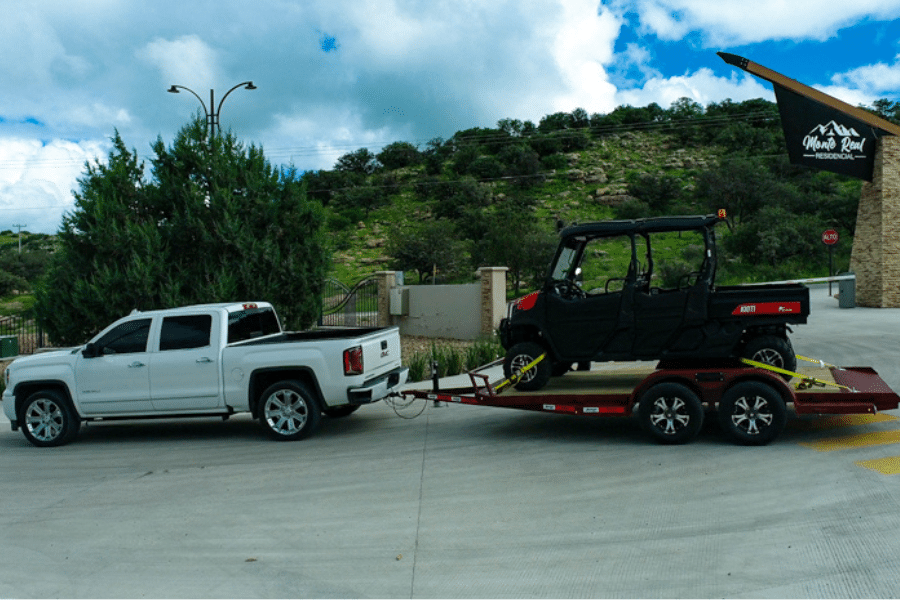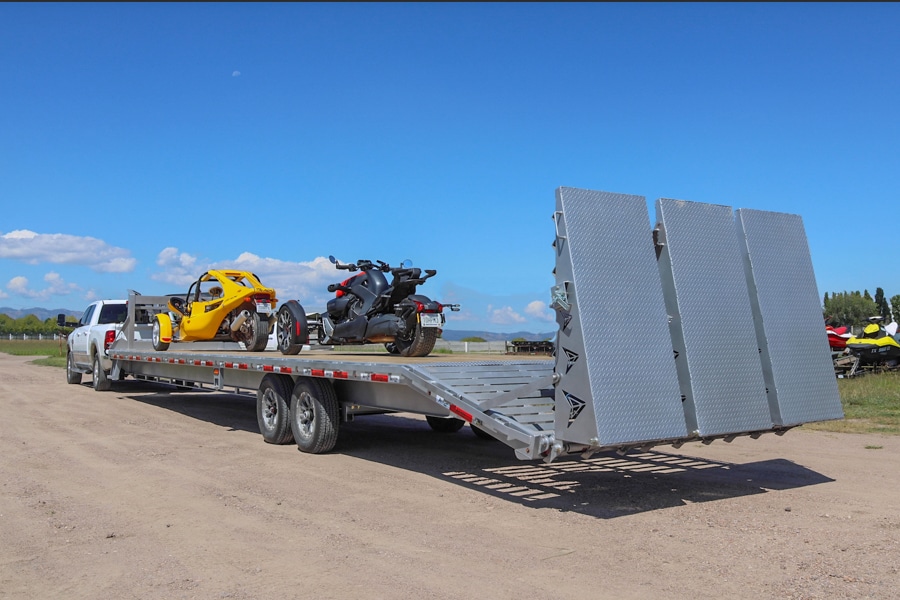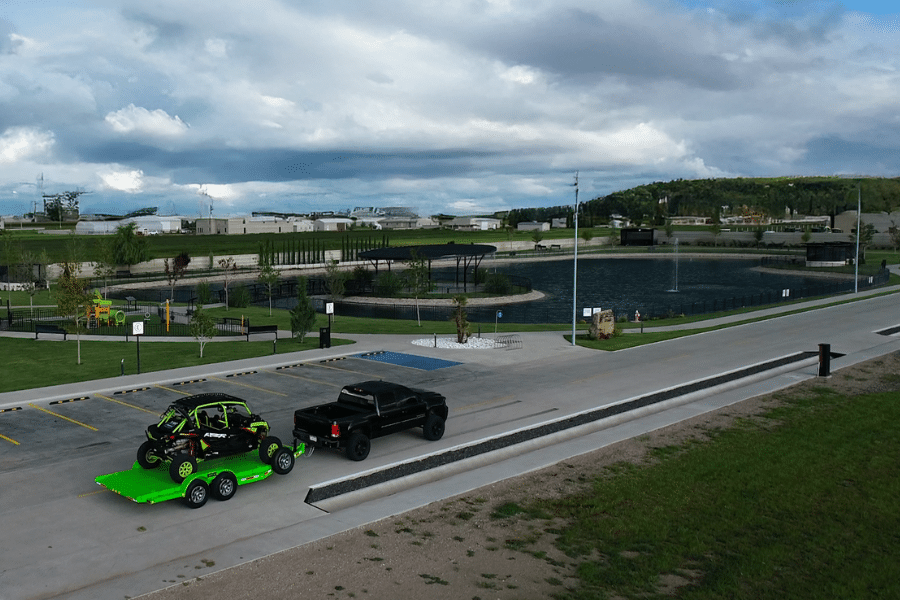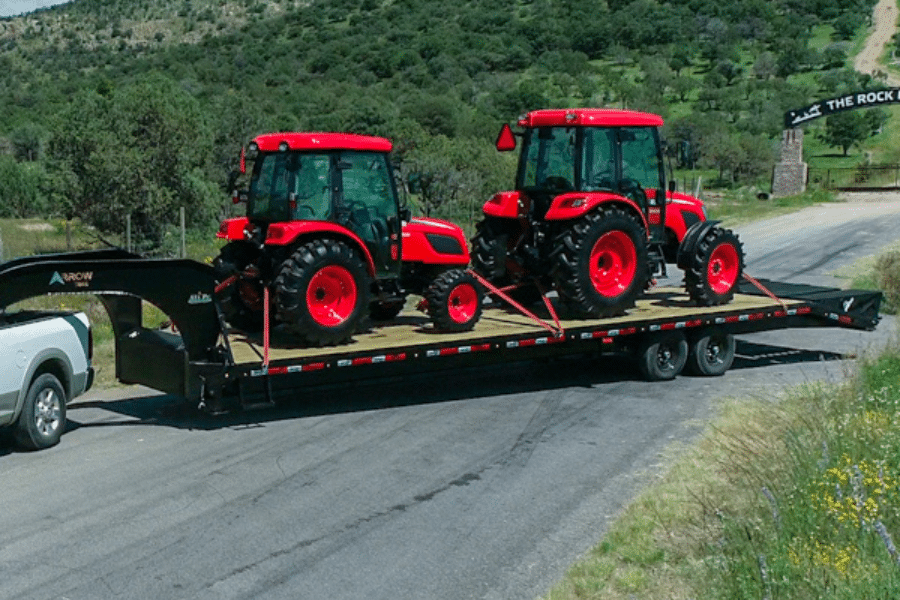What Are the Trailer Laws in Ohio?

If you plan to tow a trailer in Ohio, it is essential to understand the state’s trailer laws to avoid fines, penalties, or safety violations. From weight limits and lighting requirements to registration and braking systems, Ohio law sets clear standards for every type of trailer on the road.
In this guide, we’ll explain everything you need to know to comply with Ohio trailer laws.
Registration & Titling Requirements
Most importantly, when purchasing a trailer, make sure it is properly titled or that you receive a valid bill of sale, and complete the required registration process. We’ll outline these steps in more detail below.
Do Trailers Need to Be Registered in Ohio?
Yes, all trailers must be registered in Ohio, but the specifics of the registration process can vary depending on your trailer’s weight.
Trailer Registration Process
The trailer registration process varies depending on the type of trailer registration you plan to get as well as the size of your trailer:
Trailer’s Under 4,000 Pounds:
- No title required
- Proof of ownership needed such as a bill of sale
- Register trailer with BMV and obtain license plate
- Pay sales/use tax
Trailer’s Over 4,000 Pounds:
- A title is required
- Register trailer with BMV and obtain license plate
- Weight verification may be required on certified BMV-approved scale if weight is not clearly indicated on the ownership documents
Permanent Trailer Registration
You can also choose to pay registration fees for up to 8 years to get what is considered a permanent trailer registration for both commercial and non-commercial trailer. The permanent trailer registration differs between the two as follows:
| Registration Feature | Commercial | Non-Commercial |
| Available From | 1-8 years | Permanent only (full 8 years) |
| Plate Validitity | Permanent (no expiration sticker) | Permanent Plate & Sticker |
| Fees | Full-term fees up front | 8x annual fee and service/local taxes |
| Transferable | No (can’t change class) | No |
| Ideal For | Businesses, fleets | Personal/recreational use |
Do Trailers Need Titles in Ohio?
Yes, trailers need titles if they weigh over 4,000 pounds. Trailers under 4,000 pounds do not require a title, but you will still need proof of ownership, such as a bill of sale. To obtain a title when required, visit your County Clerk of Courts Title Office with the appropriate documentation, including proof of ownership and payment.
Trailer Dimensions & Weight Restrictions
Trailers in Ohio must meet specific dimension and weight limits. If a trailer exceeds these limits, it is classified as oversized and must follow additional regulations. Oversize trailers are subject to separate permitting and safety requirements.
To ensure compliance, contact the Ohio Department of Transportation (ODOT) for oversize and overweight vehicle guidance.
Maximum Legal Dimensions
- Height: 13.6 feet
- Width: 8.6 feet
- Length: 65 feet
Weight Limits
- Gross Vehicle Weight Rating (GVWR): 80,000 pounds
- Axle Load Restrictions:
- 650 pounds per inch of tire width
- Single Axle: 20,000 pounds
- Tandem Axle: 34,000 pounds
- Groups of 2+ Axles:
- Governed by a bridge formula: W = 500[(LN/N-1) + 12N + 36]
- Where:
- W = max gross weight on group of axles (rounded to nearest 500 lbs)
- L = spacing in feet between first and last axle in group
- N = number of axles in group
- Where:
- Governed by a bridge formula: W = 500[(LN/N-1) + 12N + 36]
Lighting, Equipment & Safety Standards
Trailers in Ohio must also be equipped with proper lighting, reflectors, braking systems, and other required safety features, which we’ll cover in more detail below. If you want to be sure your trailer includes all of these, Arrow Trail provides detailed spec sheets for every model so you can verify compliance before purchasing.
Do You Need Lights on a Trailer in Ohio?
Yes, every motor vehicle, trailer, semitrailer, or other vehicles on the road must be equipped with the following:
- Two or more stop tail lights on the rear, emitting a red light visible from 500 feet to the rear
- A tail light or separate white light must be on the rear registration plate, when required, to make it visible from a distance of 50 feet from the rear
- Must have functioning taillights, brake lights, and turn signals
- For trailers larger than 80 inches wide, clearance lights will also be required
Safety Chains, Hitches, and Couplers
All trailers operated in Ohio must be equipped with safety chains. These chains must:
- Be crossed beneath the trailer hitch
- Be strong enough to prevent the trailer from completely detaching if the hitch fails
In addition, the hitch and coupling system must:
- Be capable of safely towing the trailer and its maximum load
- Minimize trailer movement, preventing excessive whipping, swaying, or swerving during travel
Brake System Requirements
General Requirements
Trailers must meet Ohio’s minimum brake system requirements based on type, weight, and manufacturing date:
- Trailers with an empty weight of 2,000 pounds or more, manufactured or assembled on or after January 1, 1942, must be equipped with brakes.
- Travel trailers and manufactured homes built on or after January 1, 2001, must have brakes if they exceed 2,000 pounds empty weight.
- Watercraft trailers (boat trailers) with a gross vehicle weight rating (GVWR) of 3,000 pounds or more, manufactured on or after January 1, 2008, must be equipped with brakes on at least two wheels. These may be:
- Hydraulic surge brakes, or
- Electric brakes
- Hydraulic surge brakes, or
- Breakaway Requirement:
- Any trailer that is required to have brakes under the rules above must also be equipped with a breakaway system. This system must automatically apply the trailer’s brakes if it becomes detached from the towing vehicle.
Parking Brake Requirements
All trailers with a GVWR over 2,000 pounds must have parking brakes that:
- Hold the trailer securely on any grade, regardless of the load
- Can be applied manually, by spring action, or by a comparable mechanical means
- Operate independently of the service brake system in the event of brake failure
Brake Performance Standards
All trailers must meet the following stopping performance standards when tested on a dry, smooth, level road:
| Brake Setup | Required Stopping Distance (from 20 MPH) |
| Brakes on all wheels | 30 feet or less |
| Brakes not on all wheels | 40 feet or less |
Are Trailers Subject to Annual Inspection in Ohio?
Yes, but only for certain vehicles. In Ohio, annual inspections are required for trailers and vehicles used in commercial operations if they meet any of the following:
- Have a gross vehicle weight rating (GVWR) over 10,000 pounds, or
- Are used in interstate or intrastate commerce, or
- Are subject to Federal Motor Carrier Safety Regulations (FMCSR)
If you’re towing a personal-use trailer under 10,000 pounds GVWR, Ohio does not require an annual inspection.
License Plates & Driver Licensing
To tow a trailer on public roads in Ohio, you’ll need a valid license plate and the appropriate driver’s license. We’ll cover these requirements in more detail below.
Can You Drive a Trailer Without a License Plate in Ohio?
No, regardless of size or weight, all trailers in Ohio are required to have a license plate if they are operated on public roads. To ensure you have the proper license plate for your trailer, contact the Ohio Bureau of Motor Vehicles (BMV).
Do You Need A CDL to Haul a Trailer?
You only need a commercial driver’s license (CDL) if you plan to haul a trailer for commercial purposes. The following CDLs are required based on the weight of your trailer:
| CDL Class | GVWR |
| Class A | Tow vehicle and trailer or any vehicles with a GCWR of 26,001 or moreTow vehicle to has a GVWR of 10,001 or more |
| Class B | Any vehicle with a GVWR of 26,001 pounds or moreCannot be used for trailers over 10,000 pounds |
| Class C | Small vehicle that is not a Class A or B vehicle but is:Designed to transport 16 or more passengers, including the driverCarrying hazardous materials in an amount requiring placardingAny school bus that is not considered a Class A or B. |
Do You Need Insurance for a Trailer?

You do not need separate insurance for your trailer in Ohio. In most cases, your towing vehicle’s policy will provide some coverage for the trailer, especially for liability while it’s being towed. However, if you want additional protection against damage or theft, you can choose to purchase a separate insurance policy for the trailer.
What Are the Penalities For Non-Compliance?

If you fail to meet the above requirements for towing a trailer you could be subject to legal penalities such as fines, points on your license, license suspension, trailer impoundment, and even probation or community service.
Common Ohio trailer law violations include:
- Exceeding weight limits
- Failing to secure safety chains
- Insufficient lighting
To avoid costly fines or more serious consequences, make sure your trailer complies with all applicable Ohio laws and safety standards.
Find A Trailer That Meets Ohio’s Legal Standards

Failing to comply with Ohio’s trailer laws can result in serious penalties. That’s why it’s important to choose a trailer that meets the state’s legal and safety requirements. To help you make an informed decision, we’ve outlined the key features to look for and included examples of trailers that comply with Ohio regulations.
What To Look For in a Compliant Trailer
In Ohio, the following features are required for a trailer to be considered compliant:
- A maximum height of 13 feet 6 inches
- A maximum width of 8 feet 6 inches
- A maximum total length (including tow vehicle) of 65 feet
- Proper lighting and reflectors on the front, rear, and sides, as outlined above
- A rear license plate that is illuminated by a white light and visible from at least 50 feet behind
- Safety chains that are crossed and securely attached to the tow vehicle
- A braking system appropriate for the trailer’s weight
- Proper registration and titling, based on the trailer’s weight and use
- Compliance with all additional requirements detailed above
If you need help choosing the right trailer, check out our guide on selecting a trailer based on what you plan to haul. It walks you through the key factors to consider so you can find the best fit for your needs.
Browse Legal Trailer Options
Below are several trailer models that comply with Ohio’s requirements and are suitable for a wide range of hauling needs.
Get Expert Help Before You Buy
Not sure which trailer is right for you? Whether you are hauling equipment or trying to meet Ohio regulations, our Ohio-based partner Muscle Trailers can help. They have the local knowledge and experience to guide you through their inventory and match you with a trailer that fits both your needs and state requirements.
If you want to be confident that your trailer complies with Ohio law, Muscle Trailers is an authorized supplier of Arrow Trail trailers. You can download any one of our trailer spec sheets to find detailed information on height, length, width, braking systems, and other key features.
Visit Muscle Trailers or request a quote today to find the right trailer for your needs.






